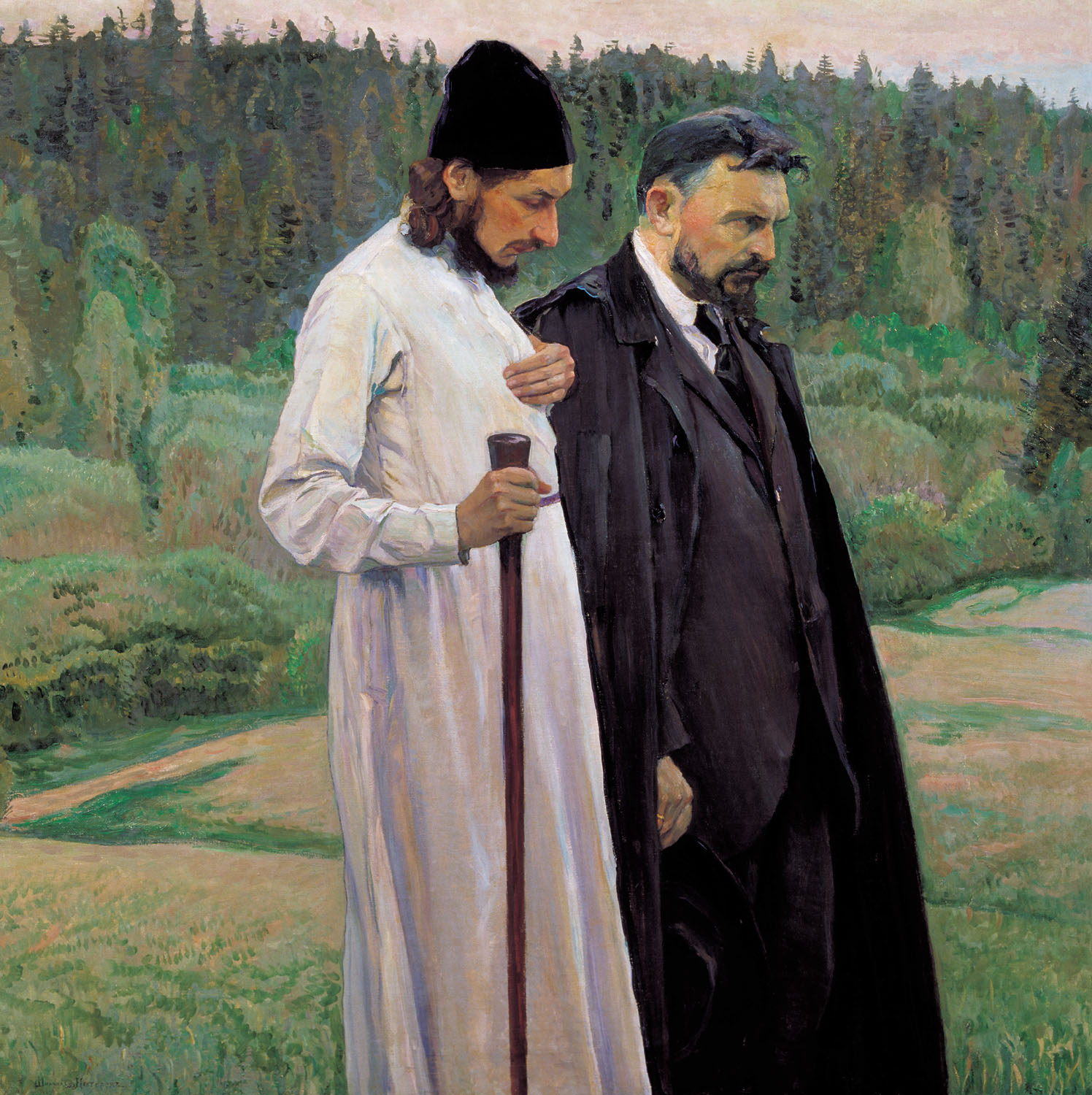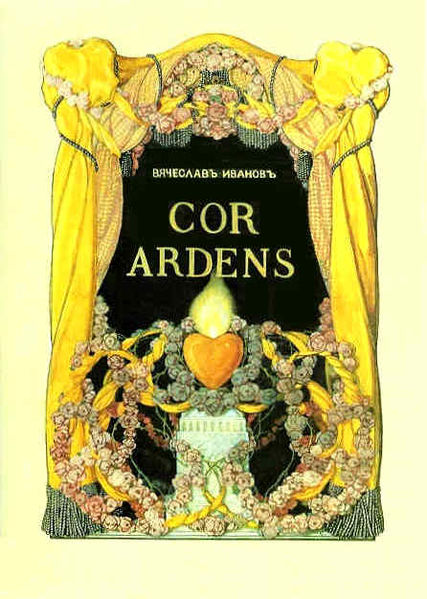|
Novy Put
''Novy Put'' (Но′вый путь, New Way) was a Russian religious, philosophical and literary magazine, founded in 1902 in Saint Petersburg by Dmitry Merezhkovsky and Zinaida Gippius. Initially a literary vehicle for the Religious and Philosophical Meetings, it was aiming to promote the so-called "Godseeking" doctrine through the artistic means of Russian Symbolism. History The first issue of ''Novy Put'' came out in November 1902. The magazine's editor-in-chief was Pyotr Pertsov, but the real leaders were Dmitry Merezhkovsky and Zinaida Gippius. The magazine, addressing the Saint Petersburg's intelligentsia, stood in opposition to the Moscow branch of Symbolists which gathered round the Scorpion publishing house and were led by Valery Bryusov. ''Novy Put'' remained loyal to Symbolism's initial values ("Arts for arts' sake", the cult of individuality) even if Merezhkovskys have by this time condemned "the new individualism" which, as Gippius put it, "devoured our society as ... [...More Info...] [...Related Items...] OR: [Wikipedia] [Google] [Baidu] |
Pyotr Pertsov
Pyotr Petrovich Pertsov (Пётр Петрович Перцов, 16 June 1868 — 19 May 1947) was a Russian poet, publisher, editor, literary critic, journalist and memoirist associated with the Russian Symbolist movement. Biography Pyotr Petrovich Pertsov was born in Kazan, a son of Pyotr Petrovich, the youngest of the four Pertsov brothers. His uncles Vladimir, Konstantin and Erast were well-known journalists; the latter, a poet, in 1831-1832 was closely linked to Alexander Pushkin. Pyotr Pertsov studied in the 2nd Kazan Gymnasium. In 1887 he enrolled into the Kazan University to study law. He graduated in 1892. In 1890 Pertsov published his first poems in Saint Petersburg newspapers ''Nedelya'' (Week) and ''Novosti'' (News) to some favourable reviews, including the one by Afanasy Fet. In 1892 he became friends with Nikolai Mikhaylovsky and joined the staff of '' Russkoye Bogatstvo'', then a liberal narodnik's magazine, as a head of the bibliography department. The infatu ... [...More Info...] [...Related Items...] OR: [Wikipedia] [Google] [Baidu] |
Alexander Blok
Alexander Alexandrovich Blok ( rus, Алекса́ндр Алекса́ндрович Бло́к, p=ɐlʲɪˈksandr ɐlʲɪˈksandrəvʲɪtɕ ˈblok, a=Ru-Alyeksandr Alyeksandrovich Blok.oga; 7 August 1921) was a Russian lyrical poet, writer, publicist, playwright, translator and literary critic. Early life Blok was born in Saint Petersburg, into an intellectual family of Alexander Lvovich Blok and Alexandra Andreevna Beketova. His father was a law professor in Warsaw, and his maternal grandfather, Andrey Beketov, was a famous botanist and the rector of Saint Petersburg State University. After his parents' separation, Blok lived with aristocratic relatives at the manor Solnechnogorsk, Shakhmatovo near Moscow, where he discovered the philosophy of Vladimir Solovyov (philosopher), Vladimir Solovyov, and the verse of then-obscure 19th-century poets, Fyodor Tyutchev and Afanasy Fet. These influences would affect his early publications, later collected in the book ''Ante Lucem''. Car ... [...More Info...] [...Related Items...] OR: [Wikipedia] [Google] [Baidu] |
Defunct Magazines Published In Russia
{{Disambiguation ...
Defunct may refer to: * ''Defunct'' (video game), 2014 * Zombie process or defunct process, in Unix-like operating systems See also * * :Former entities * End-of-life product * Obsolescence Obsolescence is the process of becoming antiquated, out of date, old-fashioned, no longer in general use, or no longer useful, or the condition of being in such a state. When used in a biological sense, it means imperfect or rudimentary when comp ... [...More Info...] [...Related Items...] OR: [Wikipedia] [Google] [Baidu] |
1904 Disestablishments In The Russian Empire
Nineteen or 19 may refer to: * 19 (number) * One of the years 19 BC, AD 19, 1919, 2019 Films * ''19'' (film), a 2001 Japanese film * ''Nineteen'' (1987 film), a 1987 science fiction film * ''19-Nineteen'', a 2009 South Korean film * ''Diciannove'', a 2024 Italian drama film informally referred to as "Nineteen" in some sources Science * Potassium, an alkali metal * 19 Fortuna, an asteroid Music * 19 (band), a Japanese pop music duo Albums * ''19'' (Adele album), 2008 * ''19'', a 2003 album by Alsou * ''19'', a 2006 album by Evan Yo * ''19'', a 2018 album by MHD * ''19'', one half of the double album ''63/19'' by Kool A.D. * ''Number Nineteen'', a 1971 album by American jazz pianist Mal Waldron * ''XIX'' (EP), a 2019 EP by 1the9 Songs * "19" (song), a 1985 song by British musician Paul Hardcastle * "Stone in Focus", officially "#19", a composition by Aphex Twin * "Nineteen", a song from the 1992 album ''Refugee'' by Bad4Good * "Nineteen", a song from the 2001 alb ... [...More Info...] [...Related Items...] OR: [Wikipedia] [Google] [Baidu] |
Semyon Frank
Semyon Lyudvigovich Frank (; 28 January 1877 – 10 December 1950) was a Russian philosopher. Born into a Jewish family, he became an Orthodox Christian in 1912. In 1922 he was expelled from Soviet Russia and lived in Berlin. In 1933 he was replaced as head of the Russian Scientific Institute. In 1945, he moved to Britain. Early life and studies Semyon Lyudvigovich Frank was born in Russia in 1877, in Moscow, in a Jewish family. His father, a doctor, died when the boy was young, and he was brought up by his maternal grandfather, M. Rossiansky, an Orthodox Jew, who taught him Hebrew and took him to the synagogue. Through his stepfather, the populist V.I. Zak, he was introduced to the works of N.K. Mikhailovsky and other revolutionaries. At secondary school he became interested in Marxism. In 1894 he began to study law at Moscow University, but spent more time preaching socialism to the workers, but by 1896 he found Marxist economic theories unsatisfactory, though he remained ... [...More Info...] [...Related Items...] OR: [Wikipedia] [Google] [Baidu] |
Nikolai Lossky
Nikolay Onufriyevich Lossky (; – 24 January 1965), also known as N. O. Lossky, was a Russian philosopher, representative of Russian idealism, intuitionist epistemology, personalism, libertarianism, ethics and axiology (value theory). He gave his philosophical system the name ''intuitive-personalism''. He spent his working life in St. Petersburg and, after his exile by the Bolsheviks in 1922, in Prague and New York. He was the father of the influential Christian theologian Vladimir Lossky.Sciabarra, Chris Matthew.Investigation: the Search for Ayn Rand's Russian Roots" ''Liberty'' 1999-10. 10 August 2006. Life Lossky was born in Kreslavka then in the Russian Empire. His father, Onufry Lossky, had Belarusian roots (his grandfather was a Greek-Catholic Uniate priest) and was an Eastern Orthodox Christian; his mother Adelajda Przylenicka was Polish and Roman Catholic. He was expelled from school for propagating atheism. Lossky undertook postgraduate studies in Germany under Wilhel ... [...More Info...] [...Related Items...] OR: [Wikipedia] [Google] [Baidu] |
Sergey Bulgakov
Sergei Nikolayevich Bulgakov (, ; – 13 July 1944) was a Russian Orthodox theologian, priest, philosopher, and economist. Orthodox writer and scholar David Bentley Hart has said that Bulgakov was "the greatest systematic theologian of the twentieth century." Father Sergei Bulgakov also served as a spiritual father and confessor to Mother Maria Skobtsova (who was canonized a saint by the Holy Synod of the Ecumenical Patriarchate on 16 January 2004). Bulgakov is best known for his teaching about Sophia the Wisdom of God, which received mixed reception; it was condemned by the Moscow Patriarchate in 1935, but without accusations of heresy. Biography Early life: 1871–1889 Sergei Nikolayevich Bulgakov was born on 16 July 1871 to the family of a rural Orthodox priest (Nikolai Bulgakov) in the town of Livny, Oryol Governorate, in Russia. The family produced Orthodox priests for six generations, beginning in the sixteenth century with their ancestor Bulgak, a Tatar from whom the f ... [...More Info...] [...Related Items...] OR: [Wikipedia] [Google] [Baidu] |
Nikolai Berdyayev
Nikolai Alexandrovich Berdyaev (; ; – 24 March 1948) was a Russian philosopher, theologian, and Christian existentialist who emphasized the existential spiritual significance of human freedom and the human person. Biography Nikolai Berdyaev was born near Kiev in 1874 to an aristocratic military family. His father, Alexander Mikhailovich Berdyaev, came from a long line of Russian nobility. Almost all of Alexander Mikhailovich's ancestors served as high-ranking military officers, but In the sixth grade, he left the cadet school and began studying for the matriculation exams for admission to the university. Nikolai's mother, Alina Sergeevna Berdyaeva, was half-French and came from the top levels of both French and Russian nobility. She also had Polish, Georgian and Tatar origins. Berdyaev decided on an intellectual career and entered the Kiev University in 1894. It was a time of revolutionary fervor among the students and the intelligentsia. He became a Marxist for a ... [...More Info...] [...Related Items...] OR: [Wikipedia] [Google] [Baidu] |
Pavel Florensky
Pavel Alexandrovich Florensky (also P. A. Florenskiĭ, Florenskii, Florenskij; ; ; – December 8, 1937) was a Russian Orthodox theologian, priest, philosopher, mathematician, physicist, electrical engineer, inventor, polymath, neomartyr and folk saint. During the later twentieth century, statements had appeared noting a recognition by the Russian Orthodox Church of him as a saint, though it was later firmly noted that no such decision had been made. Biography Early life Pavel Aleksandrovich Florensky was born on in the town of Yevlakh in Elisabethpol Governorate (in present-day Azerbaijan) into the family of a railroad engineer, Aleksandr Florensky. His father came from a family of Russian Orthodox priests while his mother Olga (Salomia) Saparova (Saparyan, Sapharashvili) was of the Tbilisi Armenian nobility in Georgia.Natalino Valentini, (ed.) Pavel Florenskij, ''La colonna e il fondamento della verità'', San Paolo editore, 2010, p. lxxi. His maternal grandmother Sofia Pa ... [...More Info...] [...Related Items...] OR: [Wikipedia] [Google] [Baidu] |
Vyacheslav Ivanov (poet)
Vyacheslav Ivanovich Ivanov (, ; – 16 July 1949) was a Russian poet, playwright, Classicist, and senior literary and dramatic theorist of the Russian Symbolist movement. He was also a philosopher, translator, and literary critic. Born into the lower Russian nobility, the multilingual Ivanov studied Classics, philology, and philosophy. He married the sister of a school friend and aspired to live as a conventional family man, until he discovered the philosophy of Friedrich Nietzsche while in Rome. Following a surrender to their mutual attraction one night in the Colosseum, Ivanov left his wife and daughter for married Russian poet Lydia Zinovieva-Annibal. Following their Orthodox ecclesiastical divorces and clandestine remarriage in a Greek Orthodox ceremony at Livorno, Ivanov and Zinovieva-Annibal returned to their homeland and plunged headfirst into Tsarist Russia's literary bohemia. For most of the remaining years of the Pre-1917 Silver Age of Russian Poetry, Ivanov ... [...More Info...] [...Related Items...] OR: [Wikipedia] [Google] [Baidu] |



